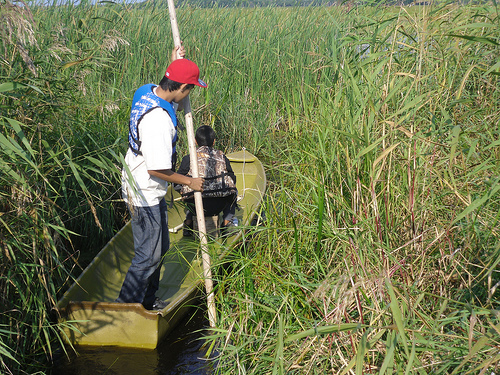Last week it was my privilege to attend the annual United Tribes Tribal Leaders Summit and associated conferences in Bismarck, North Dakota. This annual gathering is an opportunity for tribal leaders from around the region to exchange information about current issues in Indian Country.
While there, I discussed the importance of the recently-appointed Council for Native American Farming and Ranching. The Council was selected by Agriculture Secretary Tom Vilsack to suggest changes to USDA regulations and to provide internal guidance or propose measures that would promote the participation of American Indian farmers and ranchers in USDA programs and support government-to-government relations between USDA and tribal governments. The Council is a discretionary advisory committee established in furtherance of Keepseagle v. Vilsack, which was a lawsuit alleging past discrimination by USDA against Native American farmers and ranchers in the way it operated its farm loan program.
I also met with Standing Rock Sioux Tribal Chairman Charles Murphy and shared that USDA will fund a water quality project to rehabilitate and expand a failing sewage treatment system serving members of the Standing Rock Sioux Tribe. Read more »

American Indian youth ricing. The Leech Lake Band of Ojibwe rely on water to preserve their culture, their agriculture and their overall quality of life
When Leech Lake Band of Ojibwe water resource professionals discovered that 60 percent of the Minnesota reservation’s septic systems were sub-standard or failing, they feared for the reservation’s health, indigenous rice fields, and fish populations.
Shirley Nordrum, a Leech Lake Extension educator with the University of Minnesota, responded with an extensive education program. She explains to homeowners how having the sanitation department pump their septic systems could protect their health and contribute to the safety of the environment and their community. She uses funds from U.S. Department of Agriculture’s (USDA) Federal Recognized Tribes Extension Program (FRTEP) to conduct this outreach effort. Her program has become a model for other communities. Read more »
Evelyn Eagleman, 63, remembers driving the long distance off Rocky Boy’s Indian Reservation, Mont., to rescue her grandson when he was two. His father was serving in the military and his mother had been arrested on drug charges. The boy needed a new start.
She brought the child home to Rocky Boy, where she and her husband, Francis, became the child’s foster parents. Her grandson, now a teenager, will soon graduate from high school and plans to major in forestry in college. Eagleman said she and her husband are proud of the man he has become and gives much credit to the Grandparents Raising Grandchildren program at Stone Child College, in Box Elder, Mont.
“There are a lot of legal issues involved with foster parenting, and I can’t remember them all, but with this program, I know where to go for help,” she said. “We learned about our rights as foster grandparents.” Read more »
Every summer Native American, Alaska Native, and Native Hawaiian college students from across the nation come to the U.S. Department of Agriculture’s Animal and Plant Health Inspection Service (APHIS) as participants in the program Washington Internships for Native Students (WINS); I am one of them. For some of us, interning at APHIS is the first time we have ever lived off our tribal lands. For others, coming to Washington, D.C. is but another experience living in a big city. All of us, however, are linked in some way to the tribal communities we represent: the Omaha, Chippewa, Mohawk, Lumbee, Quechan, Laguna and Isleta nations.
WINS interns contribute more than just our skills and time; we add our voices. We speak as individuals from communities that are often underrepresented in government settings. We come to APHIS from states such as California, Nebraska, Oklahoma, and New Mexico and carry with us the unique perspectives of peoples from distant lands. Our respective cultures and histories, stories and languages are irrevocably parts of who we are and contribute to the way we view the world. WINS interns help bridge the gap between Washington’s governmental agencies and the people for whom they work. In the “People’s Department,” this bridge is priceless. Read more »
Recently, representatives of USDA Rural Development and other federal agencies held a collaboration meeting with the federally recognized tribes of the Ahtna Region, Alaska. The meeting was the fourth in a series of government-to-government Tribal Collaboration Meetings scheduled with tribes in Alaska. The venue for the meeting between federal officials and tribal leaders was in the beautiful remote Copper River valley at the Tazlina Community Hall. Tazlina is located seven miles south of Glennallen on Alaska’s Richardson Highway.
Tribal representatives and other partners from the region used the session in early August to discuss issues affecting their villages. Leaders from Rural Development, the Natural Resources Conservation Service, Farm Service Agency, Small Business Administration, Housing and Urban Development and the Economic Development Administration (EDA) were on hand to listen and participate in the dialogue. Read more »
The First Stewards: Coastal People Address Climate Change symposium was recently held in Washington, D.C. This meeting brought coastal area Native Americans, Alaska Natives and indigenous U.S. Pacific Islanders together with scientists, non-governmental organizations and policy makers to discuss the impacts of, and develop collaborative solutions to, climate change.
Adaptation to climate change is a pressing issue for indigenous people, who have lived closely with the ocean and coastal land for generations and depend on them for cultural survival.
The Quinault Indian Nation, Quileute Nation, Makah Nation and Hoh Tribe hosted a gathering of over 300 people July 17–20 at the National Museum of the American Indian.
One of the panels was moderated by an employee of USDA’s Natural Resources Conservation Service (NRCS), Ciro Lo Pinto, District Conservationist in Wellsboro, Penn. As part of the discussion, he shared the new Indigenous Stewardship Methods and NRCS Conservation Practices Guidebook. Read more »

